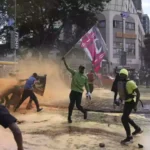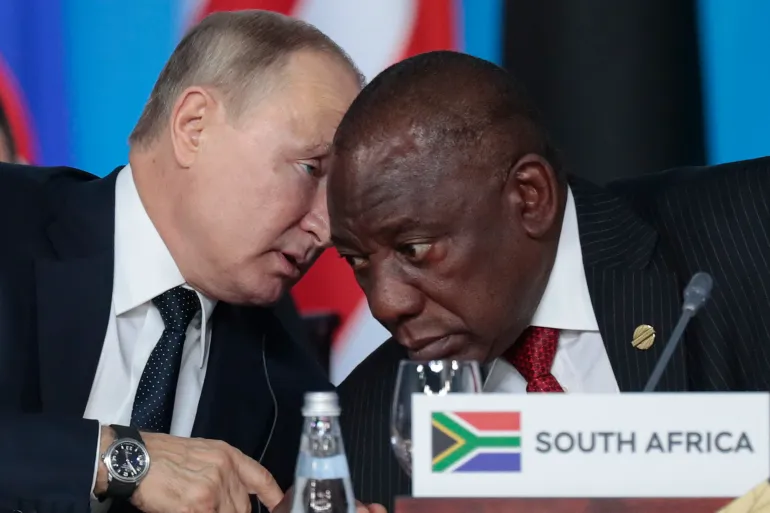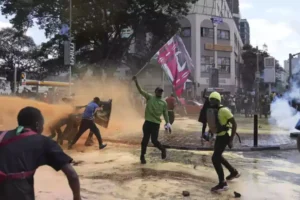Since Russia’s invasion, many African governments have officially not taken sides. But that may now be changing, even if the war’s impact on food security has not.
Harare, Zimbabwe – An imposing Russian warship armed with a powerful Zircon hypersonic missile, a handful of Chinese naval destroyers, and a host of frigates and supply vessels docked on South Africa’s coastal shores last Saturday.
The coterie of Russian and Chinese maritime firepower, which could easily bring a poorly equipped African nation’s navy to its knees militarily, would be spending days on parade in planned tri-nation naval drills off the coast of Durban in the country’s east.
A year ago, it would have been hard to imagine South Africa – which has adopted a publicly “neutral” stance on the war in Ukraine – opting to host such an event with Russia while the latter invaded its neighbour.
“[The position of ] neutrality can cost,” South African President Cyril Ramaphosa said in an interview with Bloomberg last March. “And fortunately, we’re not alone in all this, there are many others that have chosen the same path. The benefit in all this is that we can talk to both sides.”
The old guard of African politics shared the same sentiments.
“We don’t believe in being enemies of somebody’s enemy,” Ugandan President Yoweri Museveni, who has ruled since 1986, said in July last year after hosting Russian foreign minister Sergey Lavrov when he toured African nations to rally support for the war in Ukraine.
At a continental level, it was a similar tune.
Of the 35 countries that abstained from voting in a crucial United Nations General Assembly (UNGA) resolution last March condemning Russia’s invasion of Ukraine, 17 were African.
“We do not want to be aligned on this conflict, very clearly, we want peace,” Senegal’s President Macky Sall, the then-chairperson of the African Union (AU) said.
‘Partisan’
Fast forward to a year later and with no end to the war in sight, it seems many African nations are holding their neutral position.
During a UNGA vote last week demanding that Moscow withdraw its troops from Ukraine and end the fighting, 32 countries abstained – 15 of them African.
South Africa, which is holding its joint naval drills with Russia in the same week as the anniversary of the war, was among the abstentions.
Piers Pigou, the International Crisis Group’s senior consultant for Southern Africa, said the continent’s stance on neutrality has not shifted.
“The problem, of course, is the optics of [South Africa’s naval engagements at] this time. It’s astonishing that they wouldn’t have known sometime in advance that the timing of this thing would be awkward. But they don’t seem to care too much about that,” Pigou told Al Jazeera.
“It means they are doubling down on a position they say is non-aligned but certainly gives the impression to many people that they are partisan.”

And optics are proving to be everything.
“The United States has concerns about any country … exercising with Russia as Russia wages a brutal war against Ukraine,” Karine Jean-Pierre, the White House press secretary said last month when responding to queries on South Africa’s naval drills with Russia.
This came at the same time that the US plans to introduce a bill that would compel Washington to punish African countries who aid and abet what it sees as Russian “malign” activities on the continent.
Called the Countering Malign Russian Activities in Africa Act, which is expected to become law soon, it seeks to counter what the US considers to be Russia and its proxies’ hostile influence on the continent.
The legislation “is causing a bit of controversy with the potential to punish countries trading with Russia”, Pigou said, adding that it is “the big pebble in the shoe at the moment”.
Diplomatic charm
However, on the African continent, where Washington struggles diplomatically, Russia appears to be succeeding.
Foreign minister Lavrov, who last year met leaders of Angola, Botswana, Eswatini, Eritrea, South Africa, Egypt, the Republic of Congo, Uganda and Ethiopia on a series of trips to the continent, has been able to charm diplomatically.
Of the four states he first visited in July, three – Congo, Ethiopia and Uganda – chose to abstain at the UNGA meeting in October when asked to vote to condemn Russia’s attempts to annex Ukrainian regions.
Outside of the Ukraine conflict, Russia has also been making massive in-roads in other parts of Africa, including Sudan, Central African Republic, and Mali where the Wagner group, a mercenary organisation linked to Moscow, is involved in the fighting while some Western military forces, such as the French army in the Sahel, have made the decision to leave.
Source : Aljazeera
















